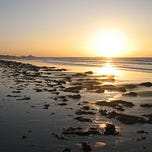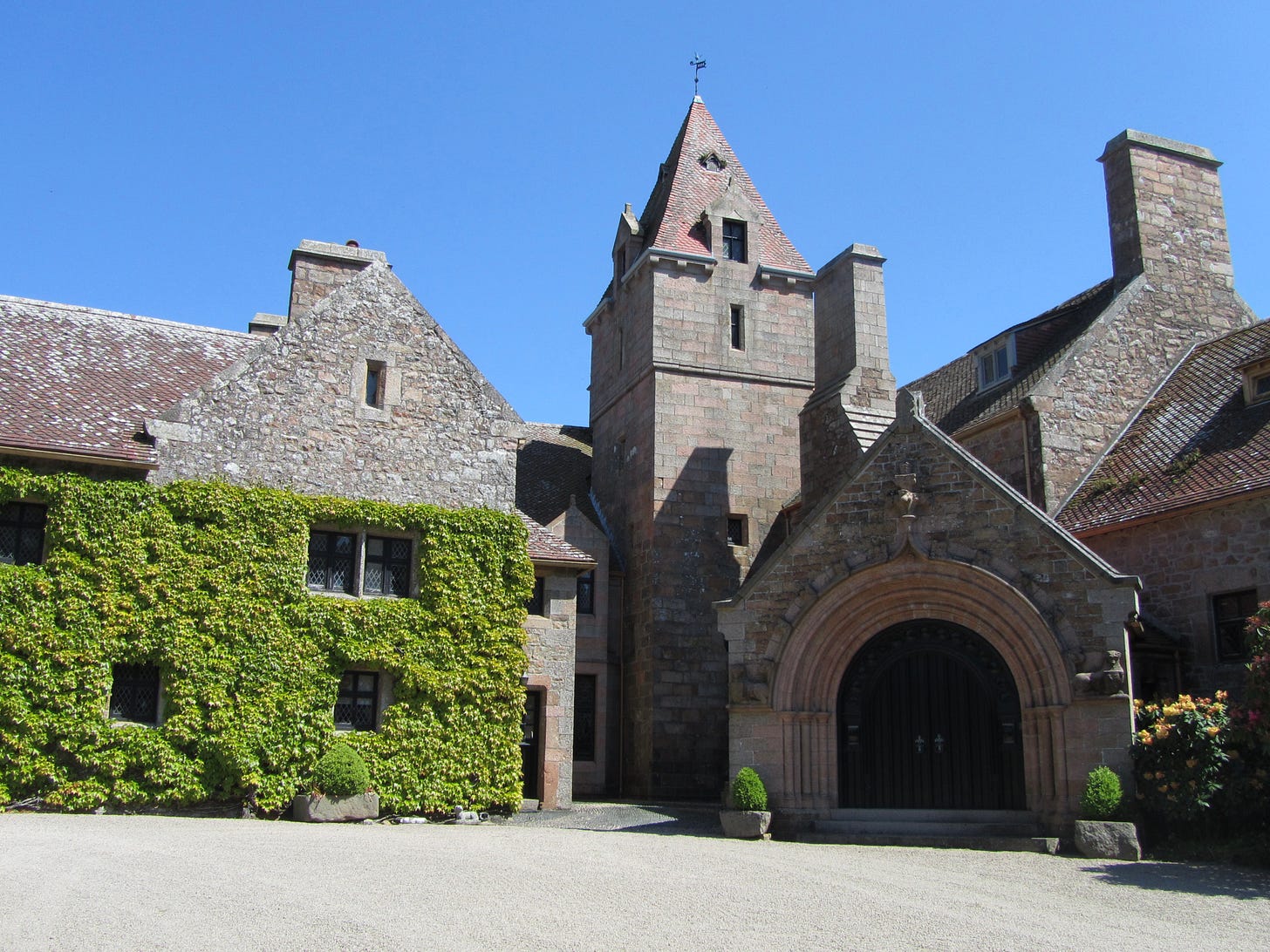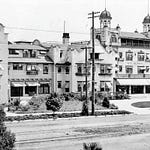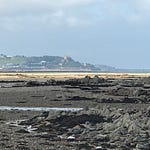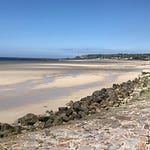Welcome to another episode of the History Islands. This week I bring you one of Jersey’s most curious and engaging legends - a medieval tale of a heroic, faithful steed. I hope you enjoy it ~ Paul Darroch
Philippe de Carteret
St Ouen’s Pond, Jersey
September 1467
The summer sun was dying in the western sky. Philippe de Carteret watched as the disc of reddish copper plunged into the ocean, and the darkness raced to meet him over the sands.
The grizzled Seigneur of St Ouen lingered on the edge of the dunes awhile longer, lost in the depths of his thoughts. He was tall and vigorous, not yet forty years old, yet a man ageing before his time. His shoulders carried the burden of cares too heavy to measure. His face was riven by scars, for he had fought too hard for too long.
Philippe stood on wounded ground. Barely a century before, a storm had drowned the nearby manor of La Brecquette and scoured the very foundations clean. His father had told him the story many times, of the day the great wave came. Tides can turn so suddenly, he noted, fortunes may change, and many who are now great will later be swallowed up by the sand.
It was a portent of the world to come. In recent years, England had been torn apart by civil war, as the white and red roses of York and Lancaster clashed like duelling dragons, seeking to devour each other. A single flick of their tails had been enough to cast Jersey into the abyss.
The Island proved an ideal bargaining chip, a toy to be traded between princes. The Lancastrian queen had slipped the keys to the French. Through ruse and treachery, a postern gate left ajar at Gorey Castle, the wolf had been let in through the door. His name was the Count of Maulevrier, and he was the new Lord of the Isles. His warlords roamed the parishes without restraint, rustling sheep like vagabonds, plundering without quarter.
There was only one stumbling block to his unfettered power: the lone man staring at the setting sun. Philippe de Carteret was the scion of an ancient line of Jersey nobility. To be sure, a determined army might dislodge him from his bastion, his heavily fortified manor house of St Ouen. Yet the price in blood and treasure would be high, for Philippe commanded the fierce loyalty of the West. Some subtler ruse would be needed to bring him to heel.
Even as the Count seethed with anger, correct chivalric form insisted that a pretence of cordiality should be maintained. The Seigneur and his wife dined with the occupation army at Mont Orgueil; honour was upheld. Yet it was an open secret that Philippe’s true fealty lay with the English crown. His days of safety were numbered, as surely as the hourglass slipped towards sunset.
Philippe turned back to his manorial pond, silvery and smooth as a mirror. He had spent a full day fishing, hoping that the simple rhythm of line and hook could ease his troubled mind. Now the catch was in, the day was done. So, he lobbed a stone into the water, watching the ripples on the pond spread and diminish, until they were finally gone. Like life itself, he mused; drama and passion, fading to black. The lake lay as still as the night.
Philippe’s black steed paced softly behind him on the shoreline, a handsome war horse. They called him a destrier: foremost among his kind, powerful and strong, a visible sign of his lordly status. He had been his faithful companion for years and seen his fair share of combat.
Suddenly, the great horse whinnied: a terrifying and unmistakeable cry of fear. Philippe threw aside his fishing pole and leapt to his feet. In an instant, he sprang up onto the saddle, reaching for his sword, ready to face the imminent threat. It was almost too late.
Armed men were rising up from the sands, curved falchions drawn, ready to seize him, or cleave him in two if he resisted. There must have been nine or ten of them, French soldiers, bristling with knives. Their leader brandished a coil of rope, the better to bind their prisoner. The ambush had been sprung.
The odds were impossible. Philippe spurred his horse, charging across the sands, up and away from the pond, making for the higher ground. It was not an easy flight; the dunes were steep and treacherous, riddled with snares, a natural defensive barrier that protected the Island from the west.
As if in a dream, he rode for the hills, but his lead was slender. The French soldiers had mounted their own chargers. It was evident that these were no common men-at-arms but highly trained knights; the Count had sent his finest riders.
Philippe fled for his life. He felt his horse’s heart exploding as he galloped up the slope, but he dared not ease off for a moment. The Seigneur could already glimpse the rondel tower of his manor house over the horizon, the promise of safety so tantalisingly close. Yet as he crested the hill, a flight of arrows burst above him. Instinctively, he swerved. The bank of arrows ripped into a nearby bank of gorse, burying their heads in the sand.
Philippe had raced straight into a trap. Too late: he saw a hedgehog of halberds bristling at the brow of the hill, a second detachment of soldiers to block him. The Seigneur lurched away and rode hard to the right, desperate to evade them before the jaws of the ambush closed. With a sinking heart, he realised he was trapped.
He was cornered. The land fell sharply away ahead, into a deep wooded valley, Le Val de la Charrière, they called it, a chasm of eighteen feet, three times the height of a man. If he fell down into the bushes below, he would be easy meat. The kidnappers were close on his heels now, steel glinting in the twilight, eager to catch their prey. A vast void of twenty-two feet separated him from safety, an angel’s leap.
The lone rider committed his soul to God. Then, with a desperate burst of power, Philippe spurred his horse and leapt into empty space. The chasm reached forward to swallow him up.
There was a strange moment of falling, as the sun died over the sea. For a moment all was frozen around him; the troop of angry, armoured riders; the horizon burning up at sunset, the green gorse and sand and sea. The stink of sweat flooded his nostrils, rising from the mane of an exhausted black horse. A horse now in mid-leap, hurtling through the air.
Like Pegasus, the horse flew. Then his forelegs struck solid earth, stumbling for grip. He struggled for a moment, but he did not fall. He charged on. At last, the strong walls of the manor were in sight. Lanterns burned on the battlements, beckoning them home.
Horse and rider burst free and clear into the yard. Philippe leapt up as the horse’s forelegs crumpled, and his body slumped to the earth. Overcome by emotion, he embraced his beloved steed, calming him as his lifeblood ebbed into the sandy soil. Then his men-at-arms rushed to meet him, ushering him to safety behind the iron gates of the stronghold. Far away in the night, his dejected foes slunk away, retreating to the east, their plot foiled.
This impossible leap of a faithful steed had changed the fate of an Island. The people would never succumb to the invader, and in time the occupiers were driven out and Jersey returned to the fold of the English crown. The horse’s sacrifice was solemnly remembered. Philippe de Carteret, mourning his loyal steed, ordered that it be buried with honour in a spot right beneath the walls of his fortress.
The legend of the black horse of de Carteret lived on, a tale of valour passed down the generations. It was immortalised in a great painting, hanging with pride of place in the Manor. Some considered it a medieval fable, a mere allegory or symbol. In the centuries to come, it was regularly retold in the guidebooks, a charming fable to amuse Victorian tourists. Perhaps it just was a child’s whisper, a fairy tale, nothing more.
Then, at the dawn of the twentieth century, routine excavations took place in the Manor grounds, digging the foundations for a walled garden. At the very spot recounted in the ancient myth, something curious was unearthed. The labourers were puzzled, until they remembered an ancient story.
They had discovered the bones of a great and noble steed.
Paul Darroch’s latest book is Jersey: Secrets of the Sea, published by Seaflower. This story appears in the Spring 2021 edition of Our Island magazine. (c) Paul Darroch 2021



